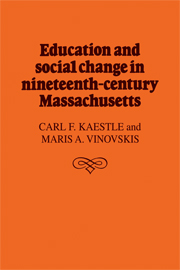Book contents
- Frontmatter
- Contents
- List of tables and figures
- Preface
- 1 Education and social change: Massachusetts as a case study
- 2 Trends in school attendance in nineteenth-century Massachusetts
- 3 From apron strings to ABCs: school entry in nineteenth-century Massachusetts
- 4 The prospects of youth: school leaving in eight Essex County towns
- 5 From one room to one system: the importance of rural–urban differences in nineteenth-century Massachusetts schooling
- 6 Education and social change in two nineteenth-century Massachusetts communities
- 7 Trends in educational funding and expenditures
- 8 The politics of educational reform in mid-nineteenth-century Massachusetts
- 9 Conclusion: the triumph of a state school system
- Appendix A Statistical tables
- Appendix B Definition of the variables contained in Tables A2.1 through A2.5, Appendix A
- Appendix C Discussion of adjustments, estimates, and extrapolations made in calculating Tables A2.1 through A2.5, Appendix A
- Notes
- Bibliography
- Index
8 - The politics of educational reform in mid-nineteenth-century Massachusetts
Published online by Cambridge University Press: 05 October 2010
- Frontmatter
- Contents
- List of tables and figures
- Preface
- 1 Education and social change: Massachusetts as a case study
- 2 Trends in school attendance in nineteenth-century Massachusetts
- 3 From apron strings to ABCs: school entry in nineteenth-century Massachusetts
- 4 The prospects of youth: school leaving in eight Essex County towns
- 5 From one room to one system: the importance of rural–urban differences in nineteenth-century Massachusetts schooling
- 6 Education and social change in two nineteenth-century Massachusetts communities
- 7 Trends in educational funding and expenditures
- 8 The politics of educational reform in mid-nineteenth-century Massachusetts
- 9 Conclusion: the triumph of a state school system
- Appendix A Statistical tables
- Appendix B Definition of the variables contained in Tables A2.1 through A2.5, Appendix A
- Appendix C Discussion of adjustments, estimates, and extrapolations made in calculating Tables A2.1 through A2.5, Appendix A
- Notes
- Bibliography
- Index
Summary
Educational reform and state intervention in schooling appealed more to some communities and some individuals than others. Previous chapters have explored support and opposition through town records, census information, and case studies. Another way to get at conflict in the process of educational development is to examine the politics of education during the formative years when state intervention was still controversial.
Historians of American education have long been interested in the question of who supported educational reform in the 1830s and 1840s, and they have put forth a wide variety of answers. Some have seen the educational revivals of the thirties and forties as the result of dedicated humanitarian leaders, such as James Carter, Horace Mann, and Henry Barnard, who aroused an otherwise apathetic public to the value of common school education. Others have argued that the educational reforms of the period resulted from the demands of workers who wanted educational opportunities for their children. Some recent scholarship on antebellum education has stressed the role of capitalists in developing an extensive public school system in order to insure stability in the emerging industrial order. There is, then, little agreement among historians about the relative importance of various groups in supporting educational reform in Massachusetts. Part of the disagreement has arisen because historians with different theories have used different types of evidence. Supporters of the great-crusader interpretation relied on the writings of elite reformers, common-man advocates looked to the platforms of worker organizations, and recent supporters of economic interpretations have analyzed the characteristics of towns that adopted educational reforms.
- Type
- Chapter
- Information
- Education and Social Change in Nineteenth-Century Massachusetts , pp. 208 - 232Publisher: Cambridge University PressPrint publication year: 1980



